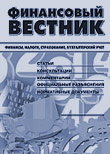Содержание
Актуально
E-mail: finance-journal@mail.ru
Подробной отчет о втором Московском финансовом форуме, который состоялся 8 сентября т.г. и был приурочен ко Дню финансиста, 215-летию Минфина России и 870-летию Москвы.
Ключевые слова: финансовая система, экономический рост, инфляция, риски, дефицит, государственный долг, ненефтегазовый дефицит, страховой рынок, налоговая политика, инвесторы, инвестиционный климат.
Финансы и бюджет: проблемы и решения
E-mail: finance-journal@mail.ru
Интервью с заместителем Министра финансов Российской Федерации
А.О. Котяковым, в котором он, отвечая на вопросы корреспондента журнала, рассказал о выделении бюджетных средств на социальную сферу, которую он курирует. В сферу профессиональных интересов А.О. Котякова входят здравоохранение, образование, науку, социальную защиту, культуру, спорт, обязательное социальное страхование, оплату труда.
Ключевые слова: социальная сфера, здравоохранение, образование, наука, оплата труда.
А.В. Кожевников, заместитель губернатора Вологодской области
С.А. Пономарева, начальник Департамента стратегического планирования Вологодской области, кандидат экономических наук
E-mail: dsp@gov35.ru
Закрепление в 2007 г. Бюджетным кодексом РФ необходимости проведения ежегодной оценки эффективности реализации долгосрочных целевых программ, а с 2013 г. – государственных программ обусловило актуальность проблем методического обеспечения такой оценки для органов государственной власти всех субъектов Российской Федерации. В статье раскрывается опыт Вологодской области по разработке методики оценки эффективности региональных государственных программ.
Ключевые слова: методика оценки эффективности, параметры государственной программы и подпрограммы, критерии оценки, коэффициент выполнения плана, коэффициент развития, коэффициент использования средств областного бюджета, индекс общей эффективности.
Налоги: теория и практика
А.З. Дадашев, профессор, доктор экономических наук
E-mail: azd120840@yandex.ru
Анализ различных сценариев налоговой реформы сопровождается расчетами фискального эффекта. Автор, в частности, пишет, что, реализуя план налогового маневра, предполагающего снижение тарифа страховых взносов до 22%, власти должны предупредить бизнес-сообщество, что в случае направления суммы расчетной экономии на прирост прибыли государство оставляет за собой право на возвращение к первоначальной ставке, скажем, по истечении двухлетнего периода.
Ключевые слова: налоговая рокировка, теневая зарплата, ставка НДС, целевой показатель инфляции, налог на прибыль и НДФЛ, взаимозависимость.
Т.И. Семкина, старший научный сотрудник Центра налоговой политики Научно-исследовательского финансового института
Тел. +7(495)6993707
Оценивается эффективность функционирования патентной системы налогообложения в России после ее введения в 2013 г., в том числе в региональном разрезе. Суммы поступлений от ПСН в бюджет сравниваются со сборами других, смежных налогов. Автор предлагает отказаться от привязки размера платежа за патент т к условиям ведения предпринимательской деятельности и исходить главным образом из численности населения регионов с разбивкой на реальные сектора.
Ключевые слова: патентные платежи, потенциально возможный доход, поступления в бюджет, дифференциация по числу наемных работников.
E-mail:5868116@mail.ru
Проф. Финансового университета при Правительстве РФ В.Г. Пансков рассказывает о предыстории и научных итогах состоявшегося в Калининграде в июле 2017 г. IX международного симпозиума «Теория и практика налоговых реформ». Состоявшиеся там дискуссии затронули такие темы, как введение прогрессивной шкалы обложения НДФЛ, экономическая целесообразность повышения других налогов.
Ключевые слова: налоговая система, налоговое администрирование, фискальное регулирование, цифровизация.
Страхование
И.Б. Котлобовский, заведующий кафедрой управления рисками и страхования экономического факультета МГУ им. М.В. Ломоносова
Н.В. Сириченко, магистр экономического факультета МГУ
E-mail: kotlobovskyopk@rector.msu.ru
Диджитализация экономики и инноваций информационного сектора драматично влияют на страховой бизнес. Статья посвящена описанию государственной политики диджитализации в страховании, новейших информационных разработок, влияющих на страхование; анализируются конкретные примеры, вызовы и барьеры на пути цифровизации страхового сектора, произошедшие здесь сдвиги.
Ключевые слова: дидижитализация экономики, инновации информационных технологий, большие данные и предиктивная аналитика, интернет вещей, блокчейн.
Э.С. Гребенщиков, кандидат экономических наук
E-mail: finvestnik@mail.ru
Основываясь на статистике мегарегулятора финансовых рынков, автор анализирует изменения, их можно назвать коренными, структуры отечественного страхового рынка, прежде всего закрепление в роли нового драйвера страхования жизни и появление новой проблемной зоны в виде агрострахования с господдержкой. Отмечается, что некоторые сектора отрасли успешно сопротивляются кризисным явлениям, что позволяет оценивать общее состояние страхового бизнеса как развивающегося, особенно с технологической точки зрения и располагающего запасом прочности с финансовой точки зрения.
Ключевые слова: страховые премии и выплаты, капитализация, источник роста, страхование жизни, э/продажи, агрострахование как новая проблемная зона, ООПО.
Из истории финансов
Г.В. Носова, старший научный сотрудник Государственного исторического музея, кандидат исторических наук
Тел.: +7(915)3429288
Ф.П. Вронченко был назначен министром финансов 1 мая 1844 года. Но и ранее нередко заменял болеющего Канкрина, хотя основными направлениями его деятельности оставались промышленность и кредитные операции. На посту министра финансов ему пришлось столкнуться с множеством трудностей, учитывая нестабильную внешнеполитическую обстановку, непрекращающиеся попытки Англии и Франции дестабилизировать российское денежное обращение, неблагоприятные природные условия (постоянные неурожаи, эпидемия чумы и др.), чтобы изыскивать средства для финансирования увеличивающихся военных расходов, продолжения строительство казенной железной дороги между Петербургом и Москвой, ускорения промышленного развития России.
Ключевые слова: министр финансов Российской Империи Ф.П. Вронченко, финансово-экономическая и промышленная политика Министерства финансов во второй четверти XIX.
Финансы зарубежных стран
Е.А. Юдин, старший научный сотрудник Научно-исследовательского финансового института Минфина России, кандидат экономических наук
E-mail: eyudin@nifi.ru
В статье отмечена актуальность проблемы сокращения государственного долга, включающего задолженность федерального бюджета, бюджетов земель, местных органов власти и федеральных внебюджетных фондов. Рассматривается метод «долгового тормоза», который позволяет органам государственной власти регулировать уровень финансовых заимствований. Подчеркивается, что корректировка уровня заимствований с помощью циклического компонента и других показателей осуществляется в зависимости от роста или снижения объема валового внутреннего продукта в конкретном финансовом году. Автор отмечает, что в настоящее время имеются как сторонники, так и противники немецкой методики управления государственным долгом. Приводятся показатели, отражающие динамику государственного долга в период 1995–2015 гг.
Ключевые слова: государственный долг, валовый внутренний продукт, финансовые заимствования, метод «долгового тормоза», циклический компонент.
Annotation
Detailed report and review of contributions made at the 2nd Moscow Financial Forum, that took place on September 8 and coincided with the Financier Day, 215- th anniversary of founding of the Ministry of Finance of the Russian Federation and 870-th anniversary of Moscow.
Keywords: financial system, economic growth, inflation, risks, deficit, public debt, non-oil and gas budget revenues, budget deficit, insurance market, fiscal policy, investors, investment climate.
E-mail: finance-journal@mail.ru
Interview with deputy minister of Finance of the Russian Federation A.O. Kotyakov who oversees the social finances sphere at the ministry. The latter spoke about allocation of public funds for for such sectors as healthcare, education, science, social security, culture, sport, mandatory social insurance, labor remuneration.
Keywords: social sphere, healthcare, education, science, labor expenses.
A.V.Kozhevnikov, vice-governor of Vologda region
S.A. Ponomareva, head of strategic planning department of Vologda region, candidate of economic sciences
E-mail: dsp@gov35.ru
The duty to evaluate performance and payoff from long-term target-oriented programs was captured in the RF Budget Code in 2007. Since 2013 executive agencies are obliged to evaluate government – funded programs. This required rendering the methodological support for conducting such an evaluation. The northern Vologda region experience in this field is revealed in the article.
Keywords: evaluation of the performance, methodology, state program and sub-program parameters, assessment criterion, coefficient of the plan’s implementation, development quotient, coefficient of regional public funds spending, index of general efficiency, average compound evaluation.
A.Z. Dadashev, full professor, doctor of economics
E-mail: azd120840@yandex.ru
The author presents analysis of different options for tax reform with estimation of anticipated fiscal effects of proposed legislative changes. The taх maneuver favored and promoted by the Ministry of finance implies reduction of social tax (insurance payments) and thus salary taxes in exchange for proportionate raising of VAT. The scheme is known as 22х22 and its aim is to stimulate entrepreneurial activity but has not yet received final endorsement. The article maintains that sums gained through this tax reform should be directed to fund capital investments but not to increase profits of businesses.
Keywords: hidden wages, VAT rate, target inflation rate, corporate income tax, personal income tax, correlation, redistribution of tax burden, fiscal castling.
T.I. Semkina, senior researcher at the Center for fiscal policy of Financial research institute of the Ministry of finance
Tel. +7(495)6993707
What results have been achieved by patent taxation system since its introduction in 2013? Particular consideration is given to regional revenues from selling patents aspects as long as each region sets its own rules. Revenues generated from the patent system are compared to other similar taxes. The author argues against pegging amount of patent fees to business environment characteristics and prefers to take into account as a unit of measurement mostly the population rate in regions with breakdown of local economy into real sectors for tax purposes.
Keywords: patent fees, potential income, budget revenues, differentiation by number of employees.
E-mail:5868116@mail.ru
Professor at Financial university under the Government of Russian Federation V.G. Panskov writes about back-story and scientific results of 9th International symposium “Theory and practice of tax reforms” that took place in Kaliningrad on July 2017. The discussions during the event regarded such issues as introducing the progressive taxation scale for personal income tax, economic efficiency of raising other taxes and other issues.
Keywords: tax system, tax administration, fiscal regulation, digitizing.
I.B. Kotlobovsky, head of Risk management and insurance chair, Faculty of economics of Moscow State University
N.V. Sirichenko, master of science in economics at Faculty of economics of Moscow State University
E-mail:kotlobovskyopk@rector.msu.ru
The insurance business is dramatically affected by the growing digitalization of the economy and information technology innovations. The article describes public policy on insurance digitalization, cutting-edge IT developments which profoundly influence the insurance industry outlook, particular cases and application examples, emerging opportunities, challenges and barriers for further progress of insurance market.
Keywords: economical digitalization, innovations, information technology, big data and predictive analytics, internet of things, blockchain, cutting down distribution expenses.
E.S. Grebenshchikov Dr.
E-mail:finvestnik@mail.ru
The statistics collected by the financial markets mega-regulator (Central bank) reveals substantial changes in the structure of domestic insurance market, including unexpected appearance of the new driver of market development: life insurance. Also new problem zone emerged recently – agricultural insurance subsidized by the government. E.Grebenshchikov maintains that some sectors of the insurance market have proved to be quite resistant to deterioration of the macroeconomic environment so the overall balance for insurance industry as a whole is positive one; still MTPL continues to generate large losses for some leading insurance carriers.
Keywords: insurance premiums and payouts, benefits, capitalization, growth driver, life insurance, agricultural insurance, commercial one and subsidized by government, extra-hazardous enterprises.
G.V. Nosova, senior researcher at State Historical Museum, candidate of historical sciences
Tel.: +7(915)3429288
F.P. Vronchenko was appointed as a minister of finance on 1 May of 1844. But before that date he often covered for his predecessor Minister Kankrin when the latter was absent or ill. During these periods his main job focus were industries and credit operations. As a minister of finances he faced a lot of hardships, foreign policy problems, had to stabilize Russian currency circulation badly affected by natural disasters, poor harvests, raising military expenditures. He made a great contribution to the continuation of building railroad between Moscow and St. Petersburg, acceleration of industrial development of Russia.
Keywords: minister of finance of the Russian Empire, F.P. Vronchenko, financial and economic policy and industrial policy of Ministry of finances in the second quarter of 19th century.
E.A. Yudin, senior research fellow of the Financial Research Institute of the Ministry of Finance of Russia, candidate of economic sciences
E-mail: eyudin@nifi.ru
The article highlights the urgency of the problem of reducing public debt, especially the debts of the core federal budget, but also the issue of indebtedness of regional (land) budgets, budgets of municipalities and federal off-budget entities. It considers the method of «debt brake» which allows public authorities to regulate the level of financial borrowing. The adjustment of the level of borrowing is achieved through the cyclical component and other indicators depending on the growth or decrease in the volume of gross domestic product in a particular fiscal year. The author notes that at present there are both supporters and opponents of the German method of managing public debt. The article cites indicators reflecting the dynamics of the public debt during 1995–2015.
Keywords: public budget debt, gross domestic product, financial borrowing, method of «debt brake», cyclical component.













